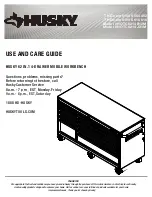
Glossary
page 41
LaCie Ethernet Disk mini
User’s Manual
Hardware
– Physical components of a computer system, including the computer itself and peripherals such as printers,
modems, mice, etc.
Host Bus Adapter (HBA)
– A printed circuit board that installs in a standard microcomputer and an interface between the
device controller and the computer. Also called a controller.
HTTP (Hypertext Transfer Protocol)
– This is the set of rules for exchanging files (i.e. text, images, audio, video, etc.) on the
World Wide Web. http is an application protocol, relative to the TCP/IP suite of protocols that form the basis for exchanging
information on the Internet.
Initialize, -ed, Initialization
– After a hard drive (or other storage device) is formatted and partitioned, some special data
needs to be written to it that helps the Mac and Windows create files and save data. The process is called initialization. This
process, like formatting, causes all user data on the storage device to be lost.
Internet
– A collection of networks whose users communicate with one another. Each communication carries the address of
the source and destination networks and the particular machine within the network associated with the user or host computer
on each end.
IP (Internet Protocol)
– This is the protocol that controls how data is sent from one computer to another on the Internet.
IP Address
– This is a number (either 32-bit for Internet Protocol Version 4, or 128-bit for Internet Protocol Version 6) that
identifies each sender or receiver of information that is sent in packets across the Internet.
Interface
– The protocol data transmitters, data receivers, logic and wiring that link one piece of computer equipment to
another, such as a hard drive to an adapter or an adapter to a system bus. Protocol means a set of rules for operating the
physical interface, such as: do not read or write before the drive is ready.
I/O (Input/Output)
– Refers to an operation, program or device whose purpose is to enter data into or to extract data from a
computer.
Kb (Kilobit)
– Equivalent to 1,000 bits.
Kb/s
– Kilobits per second. 480Kb/s is equal to 60KB/s.
KB (KiloByte)
– Basically, this means 1,000 bytes, but it is actually 1,024 bytes.
KB/s
– Kilobytes per second. A means of measuring throughput.



































